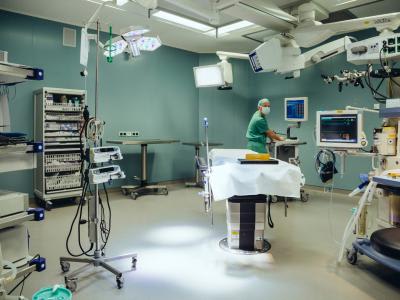This case study was originally published in our report,
The future of medtech in Australia. Download the full report >>
Specialised Therapeutics is a privately-held biopharmaceutical company that partners with international biotech and pharmaceutical businesses without a presence in Oceania. It then in-licenses, commercialises and champions partners’ products, as if they were their own.
As its name suggests, Specialised Therapeutics focuses on products that have a unique proposition in fulfilling a unmet medical need. The medicines are typically low-volume, high-value products. For example, even if only 100 units are sold each year, this could represent revenue in excess of a million dollars.
Specialised Therapeutics looks after all the medical, regulatory and commercialisation activities for these products, including logistics, distribution and marketing.
“So, while we don’t conduct the original the research and development underpinning our products, we treat all of them as if they were developed by us. “We don’t want ‘me-too’ therapies. We always look to license products where there is a genuine an unmet clinical need.” The first product Specialised Therapeutics commercialised 15 years ago was Abraxane, which today is a standard treatment for breast and pancreatic cancer – becoming one of the most successful chemotherapies ever commercialised in Australia. Since then, the business has formed relationships with more than 10 partners spanning Europe, the US and Asia and expanded its product portfolio across a number of diseases.
 "We are very selective in the products we take on. We must know and understand a product intimately before we make the decision to license and our team can spend months undertaking appropriate due diligence, which involves not only knowing how a therapy works, but who it will benefit, what other products are its competitors and at what stage of the disease do patients need this therapy."
"We are very selective in the products we take on. We must know and understand a product intimately before we make the decision to license and our team can spend months undertaking appropriate due diligence, which involves not only knowing how a therapy works, but who it will benefit, what other products are its competitors and at what stage of the disease do patients need this therapy."
- Carlo Montagner Chief Executive Officer, Specialised Therapeutics
China represents a huge opportunity for the business, with companies based in this jurisdiction disrupting the global pharmaceutical market with high tech drugs at low price points.
“We want to be at the forefront of this. We have a partnership with a Chinese company which will evolve into taking on several of their other pipeline products. We are also talking to other Chinese companies to bring their products to market,” says Montagner.
Specialised Therapeutics constantly faces challenges bringing products to market, the most significant of which is patients’ capacity to afford specialist therapies and technologies. Consequently, registering its products with the Pharmaceutical Benefits Scheme (PBS) is a priority, given patients are only required to make a small co-payment to access drugs on the PBS, which may otherwise cost many thousands.
Another challenge is each product’s lengthy payback period.
The business invests between $1 million and $2 million per product applying for regulatory and reimbursement approvals, and even then, there is no guarantee of success. It can take several years between the time a drug is approved by the TGA and it being fully commercialised, generating meaningful revenue.





